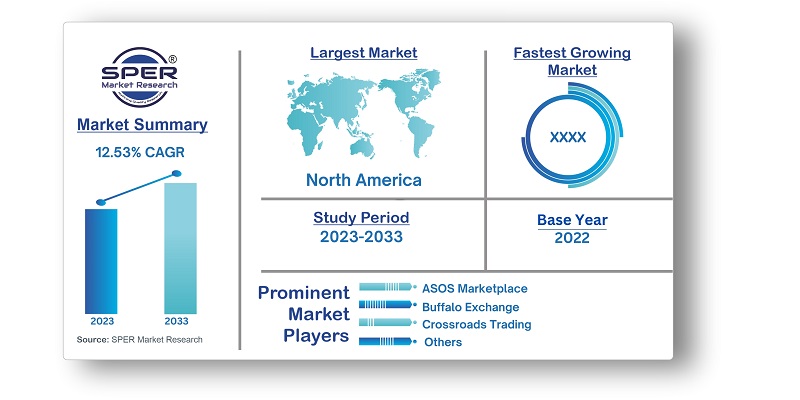
USA and Canada Second-hand Apparel Market Growth, Size, Trends, Revenue and Future Outlook
USA and Canada Second-hand Apparel Market Size- By Product Type, By Sector, By Consumer Orientation, By Sales Channel- Regional Outlook, Competitive Strategies and Segment Forecast to 2033
| Published: Nov-2023 | Report ID: FMCG23121 | Pages: 1 - 105 | Formats*: |
| Category : Consumer & Retail | |||
- In 2021: Etsy, a website that sells vintage and handcrafted goods, bought Depop. Through this acquisition, Depop gained access to Etsy's clientele and resources, allowing it to develop and grow its marketplace for used clothing.
- In 2020: The RealReal introduced the "RealReal Remade" project, emphasising upcycling and ecological fashion. Utilising recycled fabrics, the company collaborated with high-end labels such as Stella McCartney and Gucci to produce limited-edition designs that showcased their dedication to ecological sustainability.


| Report Metric | Details |
| Market size available for years | 2019-2033 |
| Base year considered | 2022 |
| Forecast period | 2023-2033 |
| Segments covered | By Product Type, By Sector, By Consumer Orientation, By Sales Channel |
| Regions covered | USA and Canada |
| Companies Covered | ASOS Marketplace, Buffalo Exchange, Crossroads Trading, Depop, Goodwill Industries, Grailed, Mercari, Poshmark, Rebag, Salvation Army, The RealReal, ThredUP, Tradesy, Vestiaire Collective, Others |
- Budget-Conscious Shoppers
- College Students
- Eco-conscious Consumers
- Fashion Enthusiasts
- Online Shoppers:
- Socially Conscious Consumers
- Vintage Collectors
- Others
| By Product Type: |
|
| By Sector: |
|
| By Consumer Orientation: |
|
| By Sales Channel: |
|
- USA and Canada Second-hand Apparel Market Size (FY’2023-FY’2033)
- Overview of USA and Canada Second-hand Apparel Market
- Segmentation of USA and Canada Second-hand Apparel Market By Product Type (Dresses & Tops, Jeans & Pants, Shirts & T-shirts, Sweaters, Coats & Jackets, Others)
- Segmentation of USA and Canada Second-hand Apparel Market By Sector (Resale, Traditional Thrift Stores & Donations)
- Segmentation of USA and Canada Second-hand Apparel Market By Consumer Orientation (Kids, Men, Women)
- Segmentation of USA and Canada Second-hand Apparel Market By Sales Channel (Direct Sales, Hypermarkets/Supermarkets, Online Retailers, Thrift Stores/Resale Stores, Other Sales Channel)
- Statistical Snap of USA and Canada Second-hand Apparel Market
- Expansion Analysis of USA and Canada Second-hand Apparel Market
- Problems and Obstacles in USA and Canada Second-hand Apparel Market
- Competitive Landscape in the USA and Canada Second-hand Apparel Market
- Impact of COVID-19 and Demonetization on USA and Canada Second-hand Apparel Market
- Details on Current Investment in USA and Canada Second-hand Apparel Market
- Competitive Analysis of USA and Canada Second-hand Apparel Market
- Prominent Players in the USA and Canada Second-hand Apparel Market
- SWOT Analysis of USA and Canada Second-hand Apparel Market
- USA and Canada Second-hand Apparel Market Future Outlook and Projections (FY’2023-FY’2033)
- Recommendations from Analyst
1.1. Scope of the report1.2. Market segment analysis
2.1. Research data Source2.1.1. Secondary Data2.1.2. Primary Data2.1.3. SPER’s internal database2.1.4. Premium insight from KOL’s2.2. Market size estimation2.2.1. Top-down and Bottom-up approach2.3. Data triangulation
4.1. Driver, Restraint, Opportunity and Challenges analysis4.1.1. Drivers4.1.2. Restraints4.1.3. Opportunities4.1.4. Challenges4.2. COVID-19 Impacts of the USA and Canada Second-hand Apparel Market
5.1. SWOT Analysis5.1.1. Strengths5.1.2. Weaknesses5.1.3. Opportunities5.1.4. Threats5.2. PESTEL Analysis5.2.1. Political Landscape5.2.2. Economic Landscape5.2.3. Social Landscape5.2.4. Technological Landscape5.2.5. Environmental Landscape5.2.6. Legal Landscape5.3. PORTER’s Five Forces5.3.1. Bargaining power of suppliers5.3.2. Bargaining power of buyers5.3.3. Threat of Substitute5.3.4. Threat of new entrant5.3.5. Competitive rivalry5.4. Heat Map Analysis
6.1. USA and Canada Second-hand Apparel Market Manufacturing Base Distribution, Sales Area, Product Type6.2. Mergers & Acquisitions, Partnerships, Product Launch, and Collaboration in USA and Canada Second-hand Apparel Market
7.1. USA and Canada Second-hand Apparel Market Value Share and Forecast, By Product Type, 2023-20337.2. Dresses & Tops7.3. Jeans & Pants7.4. Shirts & T-shirts7.5. Sweaters, Coats & Jackets7.6. Others
8.1. USA and Canada Second-hand Apparel Market Value Share and Forecast, By Sector, 2023-20338.2. Resale8.3. Traditional Thrift Stores & Donations
9.1. USA and Canada Second-hand Apparel Market Value Share and Forecast, By Consumer Orientation, 2023-20339.2. Kids9.3. Men9.4. Women
10.1. USA and Canada Second-hand Apparel Market Value Share and Forecast, By Sales Channel, 2023-203310.2. Direct Sales10.3. Hypermarkets/Supermarkets10.4. Online Retailers10.5. Thrift Stores/Resale Stores10.6. Other Sales Channel
11.1. USA and Canada Second-hand Apparel Market Size and Market Share
12.1. USA and Canada Second-hand Apparel Market Size and Market Share By Product Type (2019-2026)12.2. USA and Canada Second-hand Apparel Market Size and Market Share By Product Type (2027-2033)
13.1. USA and Canada Second-hand Apparel Market Size and Market Share By Sector (2019-2026)13.2. USA and Canada Second-hand Apparel Market Size and Market Share By Sector (2027-2033)
14.1. USA and Canada Second-hand Apparel Market Size and Market Share By Consumer Orientation (2019-2026)14.2. USA and Canada Second-hand Apparel Market Size and Market Share By Consumer Orientation (2027-2033)
15.1. USA and Canada Second-hand Apparel Market Size and Market Share By Sales Channel (2019-2026)15.2. USA and Canada Second-hand Apparel Market Size and Market Share By Sales Channel (2027-2033)
16.1. USA and Canada Second-hand Apparel Market Size and Market Share By Region (2019-2026)16.2. USA and Canada Second-hand Apparel Market Size and Market Share By Region (2027-2033)16.3. Canada16.4. USA
17.1. ASOS Marketplace17.1.1. Company details17.1.2. Financial outlook17.1.3. Product summary17.1.4. Recent developments17.2. Buffalo Exchange17.2.1. Company details17.2.2. Financial outlook17.2.3. Product summary17.2.4. Recent developments17.3. Buffalo Exchange17.3.1. Company details17.3.2. Financial outlook17.3.3. Product summary17.3.4. Recent developments17.4. Crossroads Trading17.4.1. Company details17.4.2. Financial outlook17.4.3. Product summary17.4.4. Recent developments17.5. Depop17.5.1. Company details17.5.2. Financial outlook17.5.3. Product summary17.5.4. Recent developments17.6. Goodwill Industries17.6.1. Company details17.6.2. Financial outlook17.6.3. Product summary17.6.4. Recent developments17.7. Grailed17.7.1. Company details17.7.2. Financial outlook17.7.3. Product summary17.7.4. Recent developments17.8. Mercari17.8.1. Company details17.8.2. Financial outlook17.8.3. Product summary17.8.4. Recent developments17.9. Poshmark17.9.1. Company details17.9.2. Financial outlook17.9.3. Product summary17.9.4. Recent developments17.10. Rebag17.10.1. Company details17.10.2. Financial outlook17.10.3. Product summary17.10.4. Recent developments17.11. Salvation Army17.11.1. Company details17.11.2. Financial outlook17.11.3. Product summary17.11.4. Recent developments17.12. The RealReal17.12.1. Company details17.12.2. Financial outlook17.12.3. Product summary17.12.4. Recent developments17.13. ThredUP17.13.1. Company details17.13.2. Financial outlook17.13.3. Product summary17.13.4. Recent developments17.14. Tradesy17.14.1. Company details17.14.2. Financial outlook17.14.3. Product summary17.14.4. Recent developments17.15. Vestiaire Collective17.15.1. Company details17.15.2. Financial outlook17.15.3. Product summary17.15.4. Recent developments17.16. Others
SPER Market Research’s methodology uses great emphasis on primary research to ensure that the market intelligence insights are up to date, reliable and accurate. Primary interviews are done with players involved in each phase of a supply chain to analyze the market forecasting. The secondary research method is used to help you fully understand how the future markets and the spending patterns look likes.
The report is based on in-depth qualitative and quantitative analysis of the Product Market. The quantitative analysis involves the application of various projection and sampling techniques. The qualitative analysis involves primary interviews, surveys, and vendor briefings. The data gathered as a result of these processes are validated through experts opinion. Our research methodology entails an ideal mixture of primary and secondary initiatives.



Frequently Asked Questions About This Report
PLACE AN ORDER
Year End Discount
Sample Report
Pre-Purchase Inquiry
NEED CUSTOMIZATION?
Request CustomizationCALL OR EMAIL US
100% Secure Payment






Related Reports
Our Global Clients
Our data-driven insights have influenced the strategy of 200+ reputed companies across the globe.




















